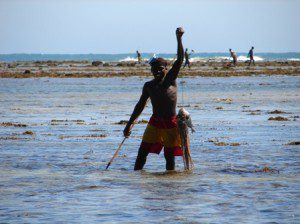By Kame Westerman, Project Coordinator, Andavadoaka. For the Velondriake equivalent of the glorious 12th, the opening of the Nosy Hao Octopus reserve is something of a reserved affair…
The procession has snaked its way down the beach with spears, masks and buckets in hand with a final total of 74 from an island population of under 100 present. Local custom dicates that having an opening ceremony on a Thursday (the day of the opening) is a good way to call down Poseidons own fury upon the good people of the island and so the blessing (known as a Fomba) was carried out on the preceding Tuesday. Stripped of the usual Malagasy pomp and circumstance, a few words from the president of the island is all that’s required for the whistle to be blown and the Octopus of Nosy Hao to be stripped of their temporary protection.
It takes 3 minutes for the first Octopus to be caught and the next 3 hours resemble a massacre that more than a few 20th century dictators would have raised an eyebrow at. Octopus fishing is normally an overwhelmingly female-dominated pursuit with fisherwomen spending many hours slowly picking their way through jagged coral rubble and an ocean of urchins brandishing batteries of razor-tipped spines in search of Octopus. Today, however, of the 74 fisherfolk dotted about the reserve, neither men, women or children dominate the demographic, signifying these reserve openings as an event of great importance in this and the five other communities opening their reserves at the same time.

For us mere Vazaha, the ability of the Vezo to track down Octopus in water up to their knees and rubble bearing more resemblance to a rabbit warren than a reef flat is nothing short of remarkable. Spears flash in and out of the water, more often than not emerging with a duelling tentacle or two wrapped around the tip. From here, a tactical battle plays out with Vezo feeding as much spear-shaft as can be spared to better the octopus’s hold on the spear and crucially, their grip on the octopus itself. Octopus are wily creatures however, and more than a few don’t take the bait, leading to spears disappearing down holes to no purchase. Conversely, more than a few arms will be bearing sucker scars from Octopus getting the better of their terrestrial tormentors. The Vezo are skilled hunters however and, before long, buckets are overflowing with Octopus ready for sale to the army of sous-collectors, descended on Velondriake for today.
As a conservationist, initially, I baulk at what is essentially a wholescale slaughter but after having the privilege of spending time in this fascinating community of incredibly skilled fishermen and women, it becomes apparent that there is little more than what the sea has to offer to them and the challenge is not the protecting the living sea but living with the sea as an environmentally aware community. Velondriake, forged from a successful trial of Octopus reserves much like those witnessed today, is charged with this single goal. In a region faced with the converging pressures of population growth and resource diminishment, reserve closures serve as a banner for commitment to conservation at a community level that can only serve to allay my consternation. The weighing, sexing and selling of the catch process reveals a less than expected first day catch due to a strong offshore wind playing more than a little havoc with visibility but all leave happy with the price achieved for their mornings work and with the tangible effects of the commitment that they have made.

